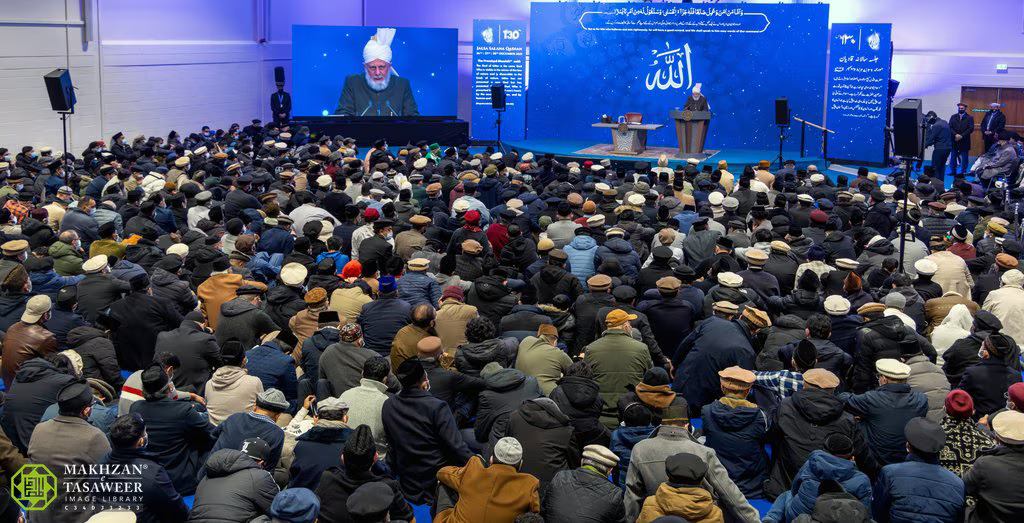THOOBA BASHEER
Life is like the game of Jenga. Each block is moved to the top, one at a time, to build the tower of life. In the beginning, the game is relatively easy, much like childhood. But as time passes, even touching the blocks becomes scary as the pile keeps wobbling with each move, tending to crumble down. Each of us battles with our own pile of blocks in life – some confused about which block to move, some unsure where to move it to, some fearful of even making a move, and some hanging tight on the verge of collapse. Nevertheless, the blocks need to be moved, or the game of life becomes stuck.
It is amidst this whirlwind of responsibilities and challenges that man struggles to find inner peace. However, despite everyone wanting peace, only a very few are able to attain it. This is primarily because of not having a proper understanding of what true peace is.
Explaining the Islamic concept of peace, the Fourth Caliph of the Ahmadiyya Muslim Community, Hazrat Mirza Tahir Ahmadrh, says:
“In Islam, the concept of peace is two-fold. Firstly, to be at peace with God and then, secondly, to be at peace with oneself and with the rest of the world… Peace is not just one dimensional or an individual concept. Peace is, firstly, to be at rest with one’s own desires and ambitions and having a balance, which is an internal affair, and secondly, to have peace with the world around and to assure everyone that one poses no threat of danger to them.”[1]
To be at peace with God means two things: Firstly, to not do anything that displeases the Creator, and secondly, to submit to His will. The concept of God is similar in almost all religions, with Him considered the embodiment of perfect attributes. Thus, not doing anything that displeases Him would imply that man adopts and practices Godly attributes, ensuring that no aspect of his behaviour is at variance with them.[2]
This becomes all the more relevant in a world where vices and immoralities are not only normalised but also glorified. Normalising bad things makes people overlook their consequences and eliminates any sense of accountability, erasing the fine line between right and wrong and resulting in the proliferation of evil in society. Just like a pebble tossed into a lake causes ripples that spread far beyond our sight, our actions too create waves, influencing people in ways we may not imagine. Thus, this aspect of peace prompts man to introspect his actions and beliefs, and ensure that he poses no threat to others, which is essential to establish peace on a wider scale beyond individual peace.
Besides, it underscores the concept of self-accountability. Usually, man is quick to blame fate, life or God whenever he faces any tribulation. However, upon close introspection, they recognise their faults and realise the role their decisions played in leading them to the difficulty they face. This helps them quickly cope with the problems they face in life and constantly move forward.
Similarly, when a person submits to the will of God, they practise acceptance towards things that are out of their control. However, submission is not confined to accepting one’s fate. Rather, it is an extension of being completely one with God that no desire or will of a person is at war with God, instilling in them the values of gratefulness and hopefulness and the strength and steadfastness to tread forward.
This principle holds greater significance in today’s world, where mental health issues are on the rise. According to studies by the World Health Organisation (WHO), mental health problems such as anxiety and depression have been increasing worldwide in recent years.[3] Suicides have also been surging[4] as people who suffer from pain run out of hope and begin to consider death as the only way out of their problems. However, a person with complete faith in God knows that He possesses the power to alleviate their difficulties and hence shows resilience in the face of challenges.
Another crucial reason for the rise in mental health problems has been identified as the increased use of social media.[5] One of the major evils perpetuated by social media is the setting of so-called benchmarks for success, happiness, and self-esteem. Contents that may seem harmless unknowingly influence one to think that their life is not as happy or happening as others, making them ungrateful for what they already have. People eventually try to attain the same life as others, following trends and associating their self-worth and pride with what happens in the virtual world. However, such people fail to realise that their happiness is grounded in pursuing other people’s lives.
Here is where the principle of being at peace with oneself becomes significant. It enables us to practice the habit of contentment, making us grateful for what we have. It eliminates any element of self-doubt from our minds and prevents us from trying to become someone else. The Holy Prophetsa imparts a very valuable lesson in this regard, saying:
“Wealth is not in having many possessions. Rather, true wealth is feeling sufficiency in the soul.”[6]
But again, one can attain contentment only when they break free from the shackles of materialism and develop a strong bond with God. The Holy Quran says:
“Aye! it is in the remembrance of Allah that hearts can find comfort.”[7]
As long as one is immersed in the material world, they remain incapable of letting go of their desires and seldom ponder over the impact of their actions upon others. The more they acquire the paltry goods of this life, the greater their hunger becomes. However, on the contrary, the more a person bonds with God, the more they experience peace of mind.
Another trend we observe in the modern world is people flocking towards gurus and godmen for peace. While there seems to be a rise in atheism and irreligion on the one hand, on the other hand, there is a huge section of people who diverge from orthodox religion and turn towards gurus.
According to media reports, it is the looming uncertainty and helplessness in the lives that make people go after these persons in search of spirituality.[8] Out of their own ignorance, when people fail to understand religion and do not experience the solace they expect from holy scriptures and God, they hope that these gurus will perform miracles and somehow resolve their issues. However, instead of offering solutions, such individuals often prescribe strange remedies to people’s problems that further exacerbate their situation, sometimes even resulting in deaths. However, their predictions probabilistically come true for a very small number of people who become convinced that they possess miraculous powers and then tell others, increasing the number of their followers.[9]
The truth is, far from possessing any powers, these gurus often do not have any association with God or His scriptures. Sadhguru, a widely followed yogi, openly admitted that he has never read Bhagavad Gita, the Vedas or the Upanishads, as he did not want to clutter his own clarity with anything external.[10]
Hence, it is a question of common sense whether occasional miracles or co-incidences possess the potential to quench man’s universal thirst for true inner peace. The fact is, there is no way to achieve peace but to recognise, believe and love the Creator, as He is the ultimate source of peace. Hazrat Mirza Tahir Ahmedrh, the Fourth Caliph of the Ahmadiyya Muslim Community, beautifully explains this concept in his book Islam’s Responses to Contemporary Issues as follows:
“It is only the love of God which can bring about true respect for His creation… Man begins to respect other men with a higher and nobler object; i.e. out of his respect and the obligation owed to his Creator, man begins to respect mankind.”[11]
That is to say, human relations would acquire an entirely different perspective if God were to be hypothetically removed from the equation. The vacuum of God’s non-existence would be immediately filled by man’s ego. His Holiness continues:
“What atheism ultimately achieves is not just the death of one God, but it suddenly brings to life a myriad of gods. Every conscious being that exists, suddenly acquires the role of a god unto himself or itself. Ego, selfishness and the total commitment to serve one’s own ends grow stronger and all-powerful. Societies, which are built with the bricks of such individuals, always remain egoistic and self-oriented.”[12]
The essence of Islamic philosophy teaches that true peace, whether at an individual or societal level, can only be achieved by returning to God. All other efforts to establish peace that sprout from selfish motives are destined to fail. Without God, there can be no peace.
END NOTES
[1] Attainment of Inner Peace, an answer provided by Hazrat Mirza Tahir Ahmadrh to a question which was raised at a session held in Cologne, Germany, on 21 August 1996, The Review of Religions, February 1997
[2] Ibid
[3] COVID-19 Pandemic Triggers 25% Increase in Prevalence of Anxiety and Depression Worldwide, WHO, 2 March 2022
[4] Global, Regional, and National Burden of Suicide Mortality 1990 to 2016: Systematic Analysis for the Global Burden of Disease Study 2016, Mohsen Naghavi et al. (2019), British Medical Journal
[5] Social Media Use and Its Connection to Mental Health: A Systematic Review, Fazida Karim et al. (2020), Cureus
[6] Sahih al-Bukhari, Kitab ar-Riqaq (The Book on the Softening of Hearts)
[7] Holy Quran 13:29
[8] Why So Many Indians Flock to Gurus, from BBC, 19 November 2014
[9] Why is Punjab increasingly turning to new gurus for comfort? from Scroll.in, 28 March 2016
[10] Retrieved from a video by SadhguruGrace
[11] Islam’s Response to Contemporary Issues, p. 268
[12] Ibid













3 Comments
Thariq · July 26, 2024 at 6:49 am
Masha Allah. Very well written article.
Shabnam · July 29, 2024 at 5:21 pm
Good one. MashaaAllah
AbdulKareem CG · July 29, 2024 at 4:40 pm
“However, a person with complete faith in God knows that He possesses the power to alleviate their difficulties and hence shows resilience in the face of challenges”.And offcourse leads to exact PEACE.
MashaAllah.very useful article.